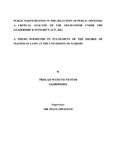| dc.description.abstract | In Kenya public participation is one of the values and principles of governance provided for under
Article 10 of the Constitution. These values and principles are binding on the State and every other
person whenever they, among other things, interpret or enact any law. Article 73(2)(a) of the
Constitution provides for criteria for selection of public officers which is that all public officers must
be selected on the basis of their personal integrity, competence and suitability. This criterion
requires participation of the public for purposes of gathering information to confirm that candidates
to public offices comply with it.
For the participation to be meaningful, it requires a guiding legal framework. In Kenya, that guiding
framework is the Leadership & Integrity Act, 2012 (L&IA). Although the L&IA exists, there are
still challenges that affect public participation during the selection of public officers. This is as
shown in the Background section of this study. It appears that the L&IA does not facilitate
meaningful public participation. The objective of the study therefore is to analyse the provisions of
the L&IA with a view to establishing whether it facilitates public participation in any way, identify
any existing gaps and also make recommendations for improvement.
Chapter 2 of this study aims at creating an understanding as to what public participation entails.
Chapter 3 contains an in-depth analysis of the provisions of the L&IA which brings out provisions
which are facilitative of public participation and the gaps. Internationally, there are some best
practices which have useful lessons and which have been used in making the recommendations.
These are outlined in Chapter 4.
Overall, the study concludes that indeed, there are some few provisions which can facilitate public
participation in the selection of public officers. However, there are also numerous gaps. The study
makes recommendations as to how those gaps can be addressed. This is seen in Chapter 5. | en_US |

